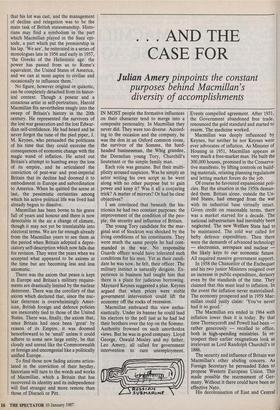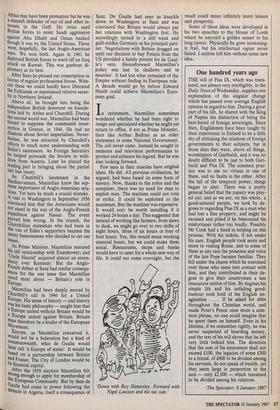. . . AND THE CASE FOR
Julian Amery pinpoints the constant
purposes behind Macmillan's diversity of accomplishments
IN MOST people the formative influences on their character tend to merge into a composite personality. In Macmillan they never did. They were too diverse. Accord- ing to the occasion and the company, he was the don in an Oxford common room, the survivor of the Somme, the hard- headed businessman, the Whig grandee, the Disraelian young Tory, Churchill's lieutenant or the simple family man.
Each role was genuine. But their multi- plicity aroused suspicion. Was he simply an actor writing his own script as he went along with no other purpose but to gain power and keep it? Was it all a conjuring trick? A matter of mirrors? Or had he clear objectives?
I am convinced that beneath the his- trionics he had two constant purposes: the improvement of the condition of the peo- ple; the security and influence of Britain.
The young Tory candidate for the mar- ginal seat of Stockton was shocked by the living conditions of his constituents. They were much the same people he had com- manded in the war. No responsible Guards officer would have tolerated such conditions for his men. Yet as their candi- date he was now, he felt, their officer. The military instinct is naturally dirigiste. Ex- perience in business had taught him that there is a place for judicious borrowing. Maynard Keynes suggested a plan. Keynes argued that when prices were stable government intervention could lift the economy off the rocks of recession.
Macmillan embraced this view enthu- siastically. Under its banner he could lead his electors to the poll just as he had led their brothers over the top on the Somme. Authority frowned on such unorthodox views. But he was in good company. Lloyd George, Oswald Mosley and my father, Leo Amery, all called for government intervention to cure unemployment. Events compelled agreement. After 1931, the Government abandoned free trade, renounced the gold standard and started to rearm. The medicine worked.
Macmillan was deeply influenced by Keynes, but neither he nor Keynes were ever advocates of inflation. As Minister of Housing in 1951, Macmillan appears as very much a free-market man. He built the 300,000 houses, promised in the Conserva- tive manifesto, by lifting controls on build- ing materials, relaxing planning regulations and letting market forces do the job.
Of course he favoured expansionist poli- cies. But the situation in the 1950s deman- ded them. Britain alone, outside the Un- ited States, had emerged from the war with its industrial base virtually intact. Given credit on reasonable terms, there was a market starved for a decade. The national infrastructure had inevitably been neglected. The new Welfare State had to be maintained. The cold war called for hefty defence expenditure. Then there were the demands of advanced technology — electronics, aerospace and nuclear — the likely keys to our economic future. All required massive government support.
In 1958 the Chancellor of the Exchequer and his two junior Ministers resigned over an increase in public expenditure, derisory even by the standards of the time. They claimed that this must lead to inflation. In the event the inflation never materialised. The economy prospered and in 1959 Mac- millan could justly claim: `You've never had it so good.'
The Macmillan era ended in 1964 with inflation lower than it is today. By that time Thorneycroft and Powell had been — rather generously — recalled to office, both in high-spending ministries. In re- trospect their earlier resignations look as irrelevant as Lord Randolph Churchill's in 1886.
The security and influence of Britain was Macmillan's other abiding concern. As Foreign Secretary he persuaded Eden to propose Western European Union. This made possible the rearmament of Ger- many. Without it there could have been no effective Nato.
His decolonisation of East and Central Africa may have been premature but he was a staunch defender of our oil and other in- terests in the Gulf. He twice used British forces to resist Saudi aggression against Abu Dhabi and Oman backed though it was by the United States. These were, hopefully, the last Anglo-American wars. We won both. Again in 1961 he deployed British forces to ward off an Iraq attack on Kuwait. This was gunboat di- Plomacy at its best.
After Suez he phased out conscription in favour of regular professional forces. With- out these we could hardly have liberated the Falklands or maintained relative secur- ity in Northern Ireland.
, Above all, he brought into being the independent British deterrent on founda- tions laid by Attlee and Churchill. During the second world war, Macmillan had been forced to suppress the communist insur- rection in Greece, in 1944. He had no illusions about Soviet imperialism. Never- theless, he was attracted by Churchill's efforts to reach some understanding with Stalin's successors. As Foreign Secretary he helped persuade the Soviets to with- draw from Austria. Later he played the leading, part in bringing about the partial test ban treaty. As Churchill's lieutenant in the Mediterranean, Macmillan knew the sup- reme importance of Anglo-American rela- tions. Yet here he made a crucial mistake. A visit to Washington in September 1956 Convinced him that the Americans would not stand in the way of the Anglo-French expedition against Nasser. The event Proved him wrong. In the crunch, the Churchillian statesman who had been in the van of Eden's supporters became the canny businessman who decided to cut our
losses.
As Prime Minister, Macmillan restored h, is old relationship with Eisenhower; and Uncle Harold' acquired almost an ascen- dancy over Kennedy. But the Anglo- French defeat at Suez had similar consequ- ences for the one issue that Macmillan eared most about — Britain's role in Europe. Macmillan had been deeply moved by Churchill's call in 1946 for a United Europe. His sense of history — and history was his basic philosophy — taught him that a Europe united without Britain would be a Europe united against Britain. Britain Must therefore be a leader of the European Movement. Europe, as Macmillan conceived it, Would not be a federation but a kind of commonwealth, what de Gaulle would later call 'a Europe of states'. It would be based on a partnership between Britain. fknd France. The City of London would be its financial capital.
After the 1959 election Macmillan felt strong enough to apply for membership of the European Community. But by then de Gaulle had come to power following the debacle in Algeria; itself a consequence of Suez. De Gaulle had seen us knuckle down to Washington at Suez and was convinced that Britain would always put her relations with Washington first. He accordingly turned to a still weak and guilt-ridden Germany as his principal part- ner. Negotiations with Britain dragged on until our decision to buy Polaris from the US provided a handy pretext for de Gaul- le's veto. Henceforward Macmillan's policy was lost 'in shallows and in miseries'. It had lost what remained of the Empire without finding its European role. A decade would go by before Edward Heath could achieve Macmillan's Euro- pean goal.
In retirement, Macmillan sometimes wondered whether he had been right to resign and speculated whether he might yet return to office, if not as Prime Minister, then like Arthur Balfour as an elder statesman in some National Government. The call never came. Instead he sought in memoirs and television performances to protect and enhance his legend. But he was also looking forward.
Few men in their nineties have original ideas. He did. All previous civilisation, he argued, had been based on some form of slavery. Now, thanks to the robot and the computer, there was no need for man to exploit man. The machine could not vote or strike. It could be exploited to the maximum. But the machine was expensive. It would only be worth installing if it worked 24 hours a day. This suggested that instead of working like farmers, from dawn to dusk, we might go over to two shifts of eight hours, three of six hours or four of four hours. Yes, this would mean working unsocial hours, but we could make them social. Restaurants, shops and banks would have to cater for a whole new way of life. It could not come overnight, but the 'Down with Roy Hattersley. Forward with Nigel Lawson and his tax cuts.' result could mean infinitely more leisure and prosperity.
Some of these ideas were developed in his two speeches to the House of Lords where he enjoyed a golden sunset to his long career. Physically he grew increasing- ly frail, but his intellectual vigour never failed. I seldom left him without some new idea.











































 Previous page
Previous page